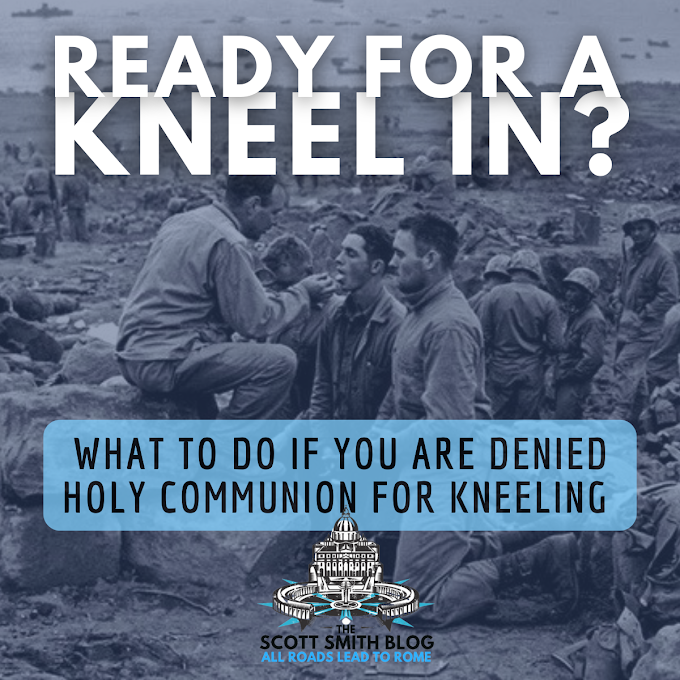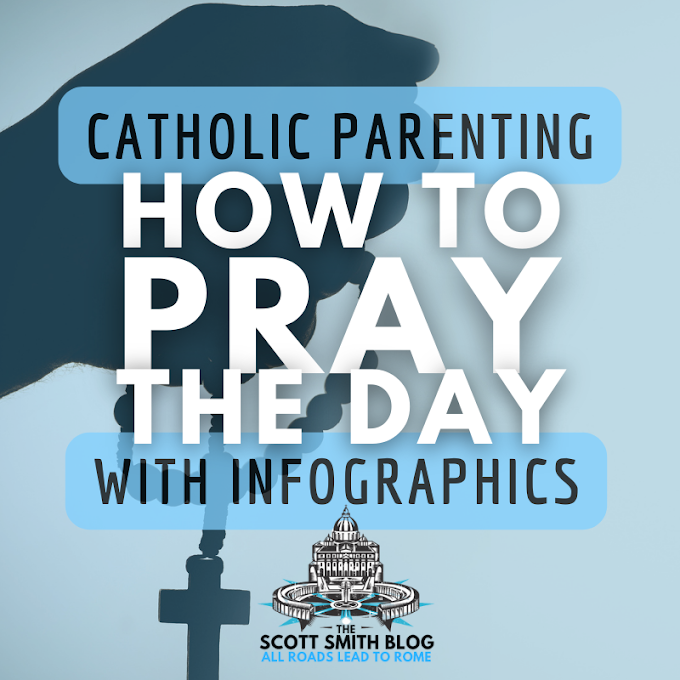Was St. Joseph an old man or a young man? "Old men don't walk into Egypt," Mother Angelica tells us. But can we get more exact than that?
Yes! The Bible actually tells us St. Joseph's exact age. We can determine St. Joseph's exact age at Jesus' conception, birth, and when he married the Virgin Mary.
This is another awesome detail about St. Joseph's life that I learned from Dr. Brant Pitre. Check out his Bible study on St. Joseph, "The Hidden King".
It's all in the original Greek.
You are going to love this ... We finally have an answer!
This is another awesome detail about St. Joseph's life that I learned from Dr. Brant Pitre. Check out his Bible study on St. Joseph, "The Hidden King".
While we're on the subject of St. Joseph ...
I was so inspired by Father Calloway's Consecration to St. Joseph that I asked Fr. Calloway if we could write a Consecration to St. Joseph for Children and Families, as well.
And here it is:
Ite ad Joseph!
Please, especially you fathers, lead your families in prayer and consecrate them to St. Joseph! Enjoy :)
Is St. Joseph an Old Man or a Young Man? How to Determine St. Joseph's Age from the Bible
There are two points in the same chapter of the Gospel of Luke that refer to a man's age. This is the first chapter of Luke. We see the age of Zechariah compared to the age of St. Joseph.
Compare Luke 1:18 and Luke 1:27.
The Age of Zechariah Compared to the Age of St. Joseph
At Luke 1:18, Zechariah has just been told that God has heard his prayers. Elizabeth is going to bear a child in her old age. Zechariah asks the angel,
How shall I know this? For I am an old man, and my wife is advanced in years.
The Greek word that Zechariah uses for "old man" is presbytēs (πρεσβύτης).
 |
| Zechariah by Michelangelo |
Presbytes. Hold on to that for a second.
Just a few verses later, another word is used for "man". At Luke 1:26-27, another word for "man" is used to describe St. Joseph:
[26] In the sixth month, the angel Gabriel was sent from God to a city of Galilee named Nazareth, [27] to a virgin betrothed to a man whose name was Joseph, of the house of David; and the virgin's name was Mary.
The Greek word used to describe St. Joseph is andri (ἀνδρὶ).
Wait? These are just synonyms for "man", right? How can these two words tell us St. Joseph's (and Zechariah's) exact ages?
What was St. Joseph's Age at the Time of Jesus' Conception and Mary's Annunciation?
Luke provides, within the space of a couple verses, two different words to describe St. Joseph and Zechariah:
That's nice, you might be thinking. But how do these words tell us St. Joseph's age?
Philo of Alexandria Provides The Ages of Manhood
In Jewish culture, certain words for man corresponded to specific age ranges. In English, we have specific terms for the ages of man: infant, toddler, boy, child, youth, man, middle-aged man, old man, etc. These terms usually do not correspond to specific ages. But in Judaism, they do.
The Church Father, Philo of Alexandria, provides the specific ages that correspond to these terms: infant, toddler, boy, child, youth, man, middle-aged man, old man. Each one is a seven-year period.
Here is the excerpt from On the Creation by Philo of Alexandria, paragraph 36: (here is a link to the PDF with the Greek and English side-by-side) [See Footnote No. 1, alternate Greek translation in brackets]
ON THE CREATION (A Treatise on the Account of the Creation of the World, as Given by Moses)XXXVI. (105) Solon therefore thus computes the life of man by the aforesaid ten periods of seven years. But Hippocrates the physician says that there are seven ages of man, infancy, childhood, boyhood, youth, manhood (Gk. andri ἀνδρὶ, also ánír άνήρ), middle age (Gk. presbytes, πρεσβύτης), old age; and that these too, are measured by periods of seven, though not in the same order. And he speaks thus; ``In the nature of man there are seven seasons, which men call ages; infancy [little boy], childhood [boy], boyhood [lad], and the rest. He is an infant [or little boy] till he reaches his seventh year, the age of the shedding of his teeth. He is a child [boy] till he arrives at the age of puberty, which takes place in fourteen years. He is a boy [lad] till his beard begins to grow, and that time is the end of a third period of seven years. He is a youth [young man] till the completion of the growth of his whole body, which coincides with the fourth seven years. Then he is a man (Gk. andri ἀνδρὶ, also ánír άνήρ ) till he reaches his forty-ninth year, or seven times seven periods. He is a middle aged man (also "elderly man"; Gk. presbytes, πρεσβύτης) till he is fifty-six, or eight times seven years old; and after that he is an old man.
Did you know you were a boy until your beard starts to grow? The beard is apparently the doorway to manhood (Gk. andri). (I'm glad it's not the doorway to womanhood)
Here is a summary of the ages of man per Philo and Hippocrates, above: [See Footnote No. 1, alternate Greek in parentheses]
- Infant (or "Little Boy") - Ages 0-7, the first seven
- Child (or "Boy") - Ages 7-14, the second seven
- Boy (or "Lad") - Ages 14-21, the third seven
- Youth (or "Young Man") - Ages 21-28, the fourth seven
- Man - Ages 28-35, the fifth seven
- Man - Ages 35-42, the sixth seven
- Man - Ages 42-49, the seventh seven
- Middle Aged Man (or "Elderly Man") - Ages 49-56, the eighth seven
- Old Man (or "Old Man") - Ages 56+, the ninth seven
More importantly, do you notice the same two Greek words we found in the Gospel of Luke? Again, we have andri and presbytes, "man" and "middle-aged man", respectively:
- "Man" or andri is the 5th, 6th, and 7th seven-year periods or ages 28-49
- "Middle-aged man" or presbytes is the 8th seven-year period or ages 49-56
Based on this, St. Joseph was between the ages of 28 and 49 when Jesus was conceived in the Virgin Mary and born. Zechariah, being a presbytes, was between the ages of 49 and 56.
There you have it!
Note Also How Philo's Reference to Hippocrates Connects to Luke, Specifically
Philo is not making up these terms himself. Look who Philo is quoting ... Hippocrates! It's not a matter of whether Luke would be familiar with Philo's terms. It's a matter of whether Luke would be familiar with medical terms.
Hippocrates was THE Greek physician. Hippocrates is even called the "Father of Medicine". Hippocrates lived during the the Age of Pericles or around the 4th century BC. Hippocrates is considered one of the most outstanding figures in the history of medicine. The "Hippocratic oath" that all physicians take is named for him.
Now, think about who Luke was. Luke was a Greek-educated physician. Do you think Luke would have been familiar with Hippocrates' works? Absolutely.
Would Luke, the physician, have known about Hippocrates?
Also, would Hippocrates' schema for describing the ages of men be known to Luke? Yes. Not only that, Hippocrates' schema would have been widely known throughout the Mediterranean and Roman world. It was so widespread, in fact, that even a non-physician, non-pagan, non-Greek like Philo of Alexandria is reciting it.
So, How Old was St. Joseph when He Married Mary? How Old was St. Joseph when Jesus was Born?
The Gospel of St. Luke makes a distinction between two words for "man" -- andri and presbytes -- in the same chapter. Since St. Joseph is identified as a "man" or andri, we can narrow down his age to somewhat to between 28-49 when he married the Virgin Mary and when Mary conceived Jesus in her womb (also called the Annunciation or Incarnation).
How's that for specificity?
Isn't that amazing?
Scholars have been fighting over the age of St. Joseph for over a millennium. All this time, the answer was just waiting for us in the first chapter of Luke.
St. Joseph may have even been the age of Jesus, when Jesus began his public ministry (30) or was crucified (33), as was another prefigurement of Jesus: Isaac. Here is an article on the age of Isaac:
How Old Was St. Joseph When He Died?
St. Joseph was between 28-49 when he married the Virgin Mary and when Jesus was conceived. St. Joseph is not mentioned again (as living) at or following the beginning of Jesus' public ministry. St. Joseph is not mentioned in the account of the Wedding at Cana, even though the Virgin Mary is. If the Virgin Mary was invited to the Wedding at Cana, St. Joseph likely would have joined her, if he could.
Therefore, Biblical scholars generally assume that St. Joseph was no longer living by the time Jesus was thirty years old.
Let's do the math. We add 30 years -- Jesus' age when he begins his public ministry -- to St. Joseph's age at the conception of Jesus. This takes us to ages 58-79. The upper limit of St. Joseph's age when he died is 58-79.
Later Apocryphal Texts Describe a MUCH Older St. Joseph
There is an apocryphal text entitled History of Joseph the Carpenter. It was originally written long after the age of Jesus and the Apostles. The History of Joseph the Carpenter dates from the 5th or 6th century.
The History of Joseph the Carpenter includes a long account of Joseph's peaceful death. The work puts St. Joseph's age at 111 at his death.
This text, however, also describes Jesus' age at St. Joseph's death at 19. This appears to contradict the canon of the New Testament, because this gives us a much older St. Joseph. If Jesus was 19 when St. Joseph was 111, St. Joseph would have been ... a whopping 92 years old at Jesus' conception!
If St. Joseph had been 92 at the conception of Jesus, St. Joseph would have been almost twice the age of Zechariah! That does not work. Taking all the evidence together, St. Joseph dying at 58-79 is a much better fit.
How would a 92-year-old man walk the Holy Family to Egypt? And defend them from all the robbers and brigands along the way? God is a better planner than that.
Old Men Don't Walk Into Egypt? Hey, What About Abraham?
Some people have argued, wait ... wasn't Abraham walking back and forth across the Middle East and wasn't Abraham well over one hundred years old?
This is a good question. But there's a big difference between St. Joseph's flight to Egypt, "by night", hunted and pursued by Herod's men and Abraham's travel by caravan.
Abraham was actually a "Merchant Prince" and extremely well-to-do. See the article on this below. Abraham was so well connected and adept at commerce that it's no wonder his great-grandson, JOSEPH the Patriarch, would later rise to prominence in Egypt.
St. Joseph and Mary did not travel to Egypt with a caravan. They traveled to Egypt alone and with a newborn.
In case there is any dispute as to the manner of Mary and Joseph "flight" into Egypt, Matthew 2:13-14 provides that Mary and Joseph went alone with Jesus into Egypt:
13 Now when they had departed, behold, an angel of the Lord appeared to Joseph in a dream and said, “Rise, take the child and his mother, and flee to Egypt, and remain there till I tell you; for Herod is about to search for the child, to destroy him.” 14 And he rose and took the child and his mother by night, and departed to Egypt,
First, the text twice provides a short list of who went with St. Joseph to Egypt. No relatives or kinsmen, much less servants or bodyguards are included in this list. Also, caravans would not depart "by night".
A Note on St. Joseph's Age and the Perpetual Virginity of Mary
Why did the apocryphal works inflate St. Joseph's age? The later writers wanted to ensure the Virgin Mary was described as perpetually virgin. St. Joseph was described as an elderly widower to ensure a separate source for Jesus' brothers and sisters. This is not necessary, however.
The Gospels, themselves, describe Jesus having "brothers" (Gk. adelphoi). Adelphoi can mean biological brothers, cousins, kinsman, etc.
Jesus' brothers are identified as James, Joseph (Joses), Judas (Jude), and Simon at Mark 6:3 and Matthew 13:55-56. These men are later identified at Mark 16:1 as the sons of Clopas and the other Mary. Unless the Virgin Mary's parents named multiple daughters "Mary", Clopas was St. Joseph's brother and Mary's sister-in-law:
But standing by the cross of Jesus were his mother, and his mother’s sister, Mary the wife of Clopas, and Mary Mag′dalene (John 19:25)
For more on the family of Jesus and Mary's Perpetual Virginity, check out these other resources:
Footnotes: How Old Was St. Joseph?
[1] Here is a SECOND link to Philo's writings, specifically "On the Creation, No. 36." You will find the quoted text at pages 84-85. F. H. Colson and G. H. Whitaker (trans.), Philo, Volume I, Loeb Classical Library, Harvard University Press: Cambridge, MA, 1981, 84-85.
Here is the text from Philo in English and Greek:
XXXVI. Solon, then, reckons the life of man by the aforesaid ten weeks of years. And Hippocrates the physician, says that there are seven ages, those of the little boy, the boy, the lad, the young man, the man, the elderly man, the old man, and that these ages are measured by multiples of seven though not in regular succession. His words are : "In man's life there are seven seasons, which they call ages, little boy, boy, lad, young man, man, elderly man, old man. He is a little boy until he reaches seven years, the time of the shedding of his teeth ; a boy until he reaches puberty, i.e. up to twice seven years; a lad until his chin grows downy, i.e. up to thrice seven years ; a young man until his whole body has grown, till four times seven ; a man till forty-nine, till seven times seven ; an elderly man till fifty-six, up to seven times eight; after that an old man."
XXXVI. Ό μέν οΰν Σόλων έβδομάσι δέκα ταΐς είρημέναις καταριθμεί τον άνθρώπινον βίον. ό δ' ιατρός Ιπποκράτης ηλικίας επτά είναι φησι, παιδιού, παιδός, μειρακίου, νεανίσκου, ανδρός, πρεσβύτου, γέροντος, ταύτας δέ μετρεΐσθαι μέν έβδομάσιν, ου μην ταΐς κατά τό εξής. λέγει δ' ούτως. " Έν άνθρωπου φύσει επτά εισιν ώραι, άς ηλικίας καλέουσι, παιδίον, παις, μειράκιον, νεανίσκος, άνήρ, πρεσβύτης, γέρων και παιδίον μεν έστιν άχρις έπτά έτέων οδόντων εκβολής* παις δ' άχρι γονής έκφύσιος, ές τά δις έπτά* μειράκιον δ' άχρι γενείου λαχνώσιος, ές τά τρις έπτά* νεανίσκος δ' άχρις αύξήσιος όλου τοΰ σώματος, ές τά τετράκις έπτά* άνήρ δ' άχρις ενός δέοντος έτέων πεντήκοντα, ές τά έπτάκις έπτά* πρεσβύτης δ' άχρι πεντήκοντα έξ, ές τά έπτάκις οκτω* το ο εντευοεν γέρων.
























5 Comments
I'm not convinced by this one reference that the system was universal with Judaism. Also, the Gospel According to St. Luke was written in Greek for a Greek. Your argument would be stronger if it were based on the Gospel According to St. Matthew.